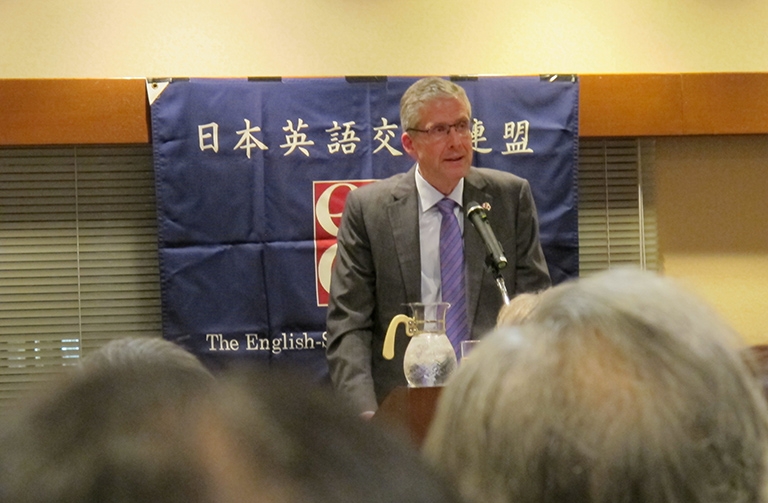Burney also spoke of the domestic situation in Canada, saying that while Canada’s origins are based on a diverse array of indigenous peoples, the country has been built in more recent times by successive waves of immigrants.
“Immigration has in fact made us what we are today, a pluralistic, tolerant, peaceful country with strong democratic values,” he said, adding that the country is accepting 300,000 immigrants and refugees each year, roughly 1% of the country’s total population.
“While nativist sentiment, as we know, has been growing in many parts of the world, I would say there continues to be a very strong and broad consensus in Canada in favor of large-scale immigration and all the rich diversity this creates,” he said, adding that “as our Prime Minister has put it, Canada has learned to be strong not in spite of our differences but because of them.”
But he said that while the domestic scene in Canada continues to be a hallmark of stability, the broader global environment has been highly volatile. In addition to the election of Donald Trump, he noted that turmoil in the Middle East has sparked refugee flows on an unprecedented scale, while tensions have risen in Northeast Asia.
“Especially worrisome has been the seemingly relentless spread of inward-looking populist movements around the world… What is clear is that we are experiencing a period of profound disruption. Western liberal values and the rules-based global order that they underpin are now under great stress.”
He said that while Canada continues to champion these values, the cost can be high, citing a dispute with Saudi Arabia over human rights issues and the arrest of a senior Chinese executive.
“Given the tumultuous global environment that we find ourselves in, it is imperative in my view that like-minded countries stand together in solidarity to uphold our values and principles.”
He said that Canada was beefing up its military with a 70% growth over the next decade and targeting development aid around gender equality and support for women and girls. He noted that at the recent G-7 summit, Canada and partners announced a package of Y320 billion in spending to support education for women and girls in conflict-hit and fragile states, the largest such package of its kind in history.
Burney said that Canada has devoted considerable political capital on the relationship with Japan, noting that Prime Minister Trudeau made Japan his first Asian destination after taking office and members of the Canadian cabinet have been regular visitors.
“Alas it must be said that the flow of high-level visits tends to be tilted in one direction,” saying that bilateral visits by senior Japanese officials tend to be rare.
He said that the main challenge facing Canadian-Japan relations is not because of conflict, but rather complacency.
“I think there is genuine affection between the people of the two countries, and the tenor of our discussions with officials when they do meet is very positive, he said.
“But the absence of major irritants between us that would require political attention, puts the relationship always at risk of being taken for granted, particularly in today’s crisis-driven environment.”
He said that “at a time of such profound global uncertainty and with the stakes so high, it is in my view more important than ever for Canada and Japan to come together to advance share priorities on the global stage.”
Burney, a specialist in trade and economic issues, became ambassador to Japan in September 2016. He spoke to the English Speaking Union of Japan, one of 54 international groupings for the London-based ESU.
